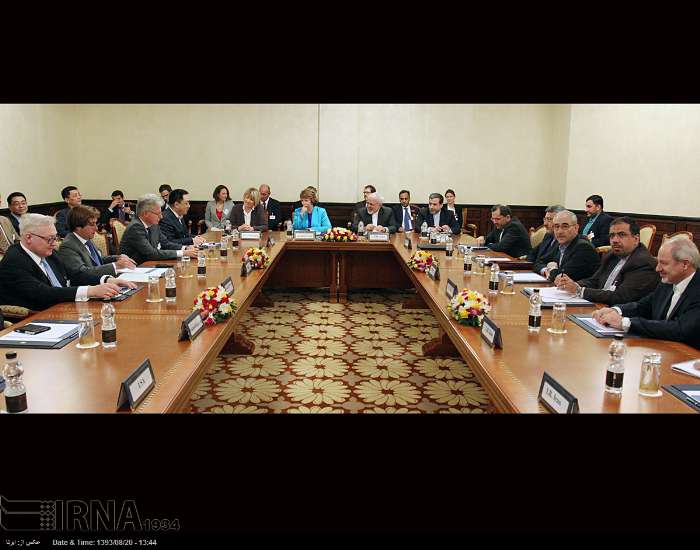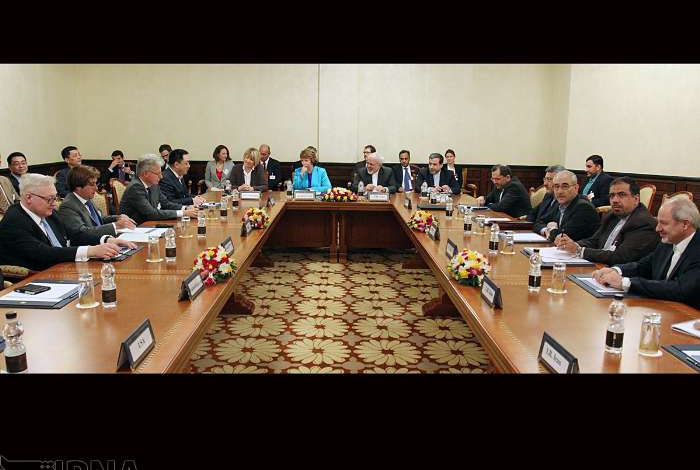 Muscat (AFP) - Iran and world powers sought Tuesday to avoid a nuclear deal falling apart on November 24, with a top Russian official expressing optimism and urging key countries to "build bridges".
Muscat (AFP) - Iran and world powers sought Tuesday to avoid a nuclear deal falling apart on November 24, with a top Russian official expressing optimism and urging key countries to "build bridges".After 24 hours in which the chances of a deal seemed to nosedive after senior officials from the United States and Iran failed to make progress, the other parties to the nuclear talks met in Oman.
The one-day meeting between Iran's nuclear negotiating team and officials from the P5+1 -- the United States, France, Britain, Russia and China, plus Germany -- was held behind closed doors.
But Russia's chief negotiator, Sergei Ryabkov, said Iran and participants in the talks should "not kill the chances" of a comprehensive deal by November 24, warning that "in the absence of creativity and responsibility" failure was possible.
"We are not working on plan B, that's for sure," he told reporters in Muscat, though he did not rule out an extension to an interim deal that expires later this month.
"If by whatever reason, by whatever development, we are not there, I think we will have time on the evening of the 23rd to develop an alternative," said Ryabkov, Russia's deputy foreign minister.
Asked why the talks appeared to be in stalemate, Ryabkov cited the "inability of parties to build bridges over still deep gaps on issues like enrichment, like sanctions."
His comments came after lengthy discussions between US Secretary of State John Kerry and Iran's Foreign Minister Mohammad Javad Zarif broke off in the Gulf sultanate late Monday with no signs of progress.
Tuesday's talks, chaired by former EU foreign policy chief Catherine Ashton, were scheduled to brief the P5+1 members on Kerry and Zarif's talks.
The West still appears unconvinced of Iran's assurances that it has not sought and will not attempt to develop an atomic bomb, while Tehran wants clearer undertakings on when sanctions will be lifted, as well as fewer curbs on its nuclear activities.
The US State Department said Kerry and Zarif's head-to-head meetings -- more than 10 hours across Sunday and Monday -- proved "tough, direct and serious", adding that "there is still time" for progress.
Iran's deputy foreign minister Abbas Araqchi, quoted by state media, was more candid.
"To reach a result by November 24 is very difficult but we do not despair," he said.
- Russia deal on reactors -
In Muscat, the Iranian delegation held bilateral talks with Russia and China, with similar discussions with Britain, France and Germany also scheduled.
As the talks in Oman got under way, Iran signalled its intent to pursue bigger atomic plans, announcing a deal that will see Russia build two new nuclear reactors at the Bushehr plant in southern Iran, taking its total number of reactors to eight.
The P5+1 wants Iran to reduce the scope of its nuclear activities -- in exchange for an easing of punitive economic sanctions imposed since 2012 which have hobbled Iran's economy.
Iran says its nuclear programme aims to produce atomic energy to reduce the country's reliance on fossil fuels, but the West and Israel suspect the fuel could be enriched to produce a bomb.
The Iranian delegation is under domestic pressure to deliver a quick and total lifting of US, UN and European sanctions under a deal. But US President Barack Obama said Sunday that sanctions would only be "slowly reduced".
The key sticking points are thought to be the number and type of uranium-enriching centrifuges Iran should be allowed to keep spinning, the process for relieving sanctions and the duration of the final deal.
Iran has said five years but world powers have suggested at least double that.
The interim deal implemented in January has already been extended once -- when a July 20 deadline was missed.
The meetings in Muscat follow the revelation that Obama recently wrote to Iran's supreme leader Ayatollah Ali Khamenei to push for a deal, arguing the Islamic republic and the West have shared regional interests.
This apparent reference to the fight against Islamic State group militants in Syria and Iraq was played down by Kerry, with the US diplomat saying "there is no linkage whatsoever" with the nuclear talks.
By AFP
The Iran Project is not responsible for the content of quoted articles.











